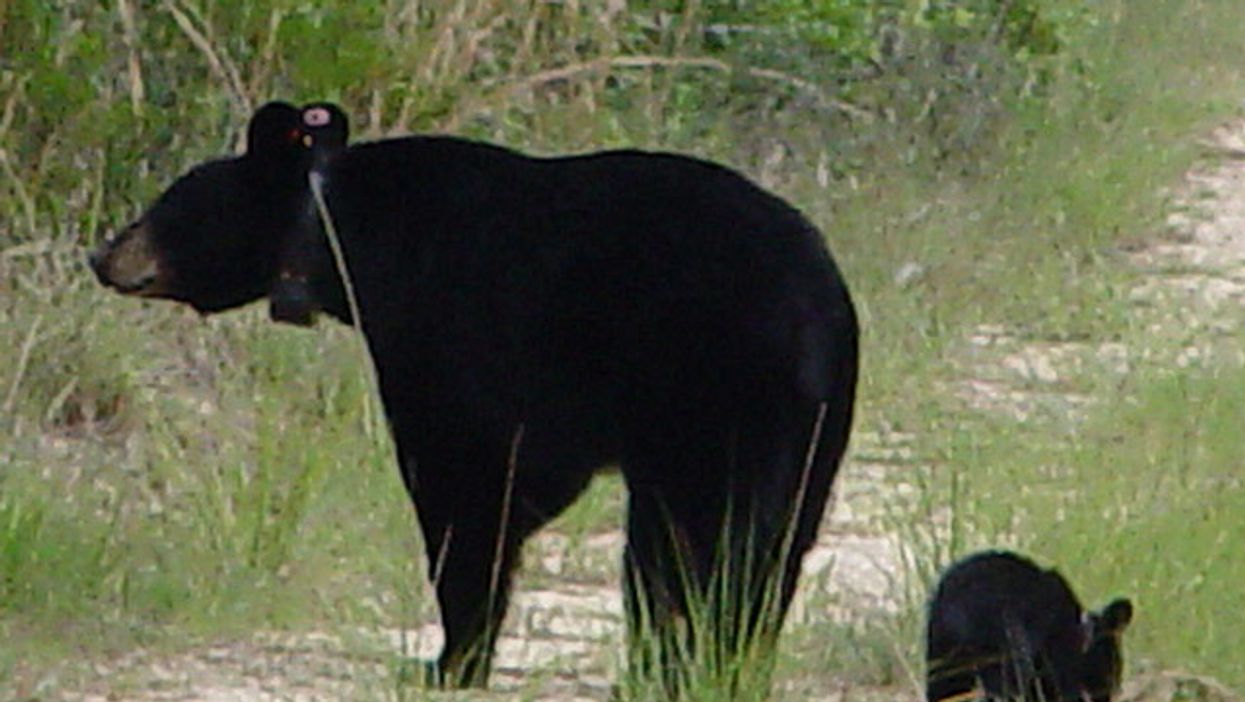Trump Administration Seeks To Revive Most Cruel Trophy Hunting Practices

Black bear mother and cub
This article was produced byEarth | Food | Life, a project of the Independent Media Institute.
Our nation's iconic wildlife is under attack in another inexplicable move by the Trump administration. In the latest blow, the government is aiming to allow the worst trophy hunting and trapping practices on public lands in Alaska.
For the first time in five years, slaughtering hibernating black bear mothers and their cubs at their dens, using bait to attract and slay grizzly bears, killing wolves and coyote pups and their parents in their dens and shooting swimming caribou on over 20 million acres of national preserve lands in Alaska will be allowed.
On top of this revival of inhumane hunting techniques, the Trump administration proposed a rule that would once again allow shameful killing methods at the Kenai National Wildlife Refuge. These include luring brown bears with doughnuts, candy and other tempting foods to make them easy shooting targets. It would also allow trapping of wildlife without the critical requirement to first obtain a federal permit—a change that will cause unnecessary suffering not only to animals targeted to be caught in cruel, serrated steel traps, but also to countless other species not even intended to be targets.
We know what this killing looks like. The video we obtained and released in 2019 showed footage of a father and son slaughtering a black bear mother and her screaming newborn cubs in their den, followed by smug and bloody high-fives by the killers, demonstrates one of the most shocking practices that this administration has chosen to make legal on more federal public lands in Alaska.These maneuvers by the administration are a blatant gift to the special interests behind the small cluster of people who either profit from the unsportsmanlike slaughter of our nation's wildlife, or those who simply take pleasure in gratuitous killing.
Such intensive killing of animals on Alaska lands has devastated its wildlife populations. Wolf numbers were decimated. Every time wolves stepped out of an unmarked safety zone they were slain. Ultimately, caribou herds grew beyond the carrying capacity of the land, and wolf populations inside the national preserve suffered enormous, unsustainable losses. The situation was no better for grizzly bears as extreme killing methods sent bear populations plummeting.
To be clear, most Alaskans oppose cruel hunting practices. In 2016 and 2018, the Humane Society of the United States released polls conducted by Remington Research Group showing that the majority of Alaskans strongly oppose allowing these types of practices on lands within their state.
This isn't surprising, as wildlife watching in Alaska contributes far more to local economies than trophy hunting and trapping. Wildlife watchers in Alaska contribute over $2 billion annually toward wildlife-related recreation activities—demonstrating time and again that these majestic animals are worth more alive than dead. National Park Service lands in Alaska bring in the most money in America's national park system after California, benefitting Alaska's entire economy. Wildlife watching tourism also eclipses the funds generated in Alaska from all hunting activities; and the extreme methods at issue account for only a tiny fraction of total hunting in Alaska.
Wolves, black bears and grizzly bears are terrific lures for tourists. If their populations are depleted, visitation and tourism revenues will decline.
The Trump administration's gift to cater to special interests in these matters is especially shameful because these trophy hunters would prefer to deprive most Alaskans—and indeed most Americans—of the joys of seeing these beautiful animals in the wild. Invariably, they think, the animals' heads and hides will look better in their homes.
They are wrong, and the Trump administration's decision to enable the use of these horrible killing techniques conflicts with clear statutory directives from Congress and a tradition housed in the legacy of President Theodore Roosevelt that the federal government should conserve and protect wildlife on national preserves and wildlife refuges.
These practices are the worst of the worst and constitute wildlife mismanagement. They also make absolutely no sense for the animals, the public or the economy, and they shouldn't be sanctioned by a great nation.
Kitty Block is the president and CEO of the Humane Society of the United States.
Sara Amundson is the president of the Humane Society Legislative Fund.








